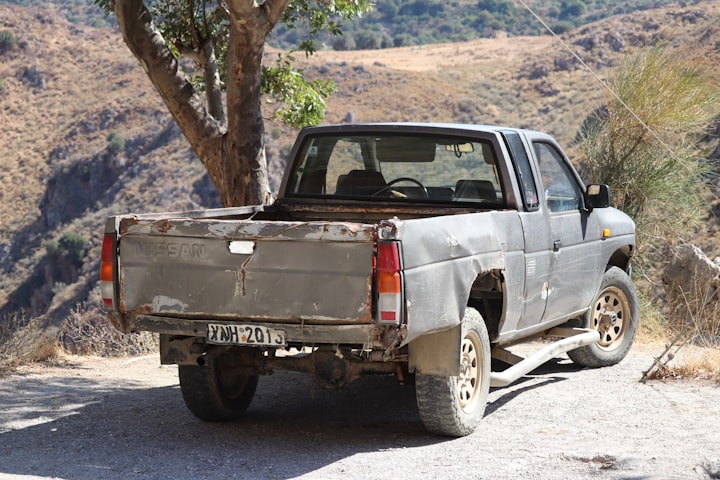
It's never a good sign when someone you’re giving mouth-to-mouth to starts bleeding from the ear. It’s even worse when every breath you breathe causes bubbles to come up through that blood with a sickening wheezing sound. What makes it all but unbearable is when the victim is a child -- a child you know -- a child who only moments ago was riding in the back of the pickup you were driving ...
Welcome to my nightmare …
* * *
It’s a beautiful day on Kauai.
It’s the weekend.
Church is over.
There’s nothing quite like a church potluck to leave you fat and lazy. The only thing that would make it more perfect would be a hammock stretched between two palm trees or a blanket on a beach. But 'tis not to be.
Too many kids running around loose to bask in either glow.
You and your wife are teachers at a one-through-ten grade church school, so naturally students look to you for anti-boredom release.
Jackie, your wife, knows what to do with boys’ abundant energy.
“Road trip!” she yells, heading to the parking lot behind the church. Six boys take the hint and follow suit, piling into the back of her small pickup. She slides in behind the wheel. You sit in back with the boys.
After a short 10-minute ride, you find yourself traversing a two-rut road -- if it can be called that -- bouncing through the rough, to a little shack out in the middle of nowhere. The truck comes to a stop. Everybody piles out. Cresting the rise, you see a dam of sorts spanning more than 100 yards in a graceful curve, water spilling over its entire span -- a still-functioning facet of the intricate irrigation system that moves water from the wet part of the island to its dry counterpart.
You’ve heard tell that there are underground causeways eight feet tall and 16 feet across that pass under mountains put in by the Army Corps of Engineers years ago routing rainfall into one of the largest man-made lakes on the island.
The boys take turns balancing barefoot on the lip of the dam, but soon tire of the exercise -- especially when someone discovers overripe papayas that have dropped to the ground under numerous trees in the field.
Now we’re talkin’! Food fight! Perfect ammunition -- weighing slightly less than a hardball, but mushy -- so when they hit, they splatter, painting the victim with a lovely pink blossom that grows ever bigger as shirts and pants saturate with the syrupy guts.
Food fights, according to the International Papaya-Fight rule book, usually last until one's ammunition runs out. In our case, that takes nearly two hours!
Excess energy expended, our goal accomplished, we pile back into the truck. This time, I drive and Jackie sits up front -- we being the only two not soaking wet or papaya slimed. The boys in back are reliving highlights of the battle, arms stretched out on the edges of the truck liner.
Ten minutes later, we’re back at Kahili Mountain Park, site of the school and home to at least two of the boys in back.
Parents at the church have long since gone home. Jackie told them she would call them when we got back to the school.
Cane roads are notoriously bumpy, being maintained only once every other year. I was slogging along at five miles an hour. No worries. No one has important schedules to keep. I’m headed to Luama’s house to drop their two boys off before driving up to our faculty housing
Just as we pass the lodge, Jackie says, “Pull in here. We’d better hose 'em off before turning them loose on their parents.”
Good idea. Having all but overshot the turnoff, I jerk the wheel to the left and head towards the lodge.
“Stop!” Jackie yells. I think two boys fell out of the back.”
It doesn’t make sense to me how something like that could happen, but I dutifully stop anyway. As I open the door, one of the boys who had fallen is picking himself up, brushing the dust off his pants. The other lays flat on his back at the side of the drive.
Pele, the older brother of the boy on the ground, says, “He’s not breathing!”
Quickly I kneel down beside Joshua. His eyes look glazed. I put my ear down by his mouth to listen and feel for breath.
Nothing.
I feel for a pulse.
Nada.
Having worked at two rescue squads for four years apiece at which time I became both a First Aid and CPR instructor, I know what I need to do.
Bending Joshua’s head back, lifting his neck, I plug his nose and start breathing for him, covering his mouth with my own. Between breaths I say, “Jackie be ready for two compressions.”
She knows exactly what I want. Nowadays they recommend five. Back then, it was two compressions for every breath after two starter breaths. (Today it's no breathing at all -- just 100 compressions a minute.)
Quickly we establish a rhythm.
Between breaths, I tell Pele to call 911.
Five more compressions.
Another two breaths.
After a couple more rounds, I take the two compression times to look at Joshua’s ears. A small trickle of blood is oozing out of his right one.
The next breath causes bubbles to form. I hear a slight wheezing sound.
As a CPR instructor, I know now there is little hope … Air moving from mouth to ear indicates a fractured skull opening a clear path to the Eustachian tube.
Still, protocol calls for us to continue sustaining him. We’re not doctors. We have to assume there’s a chance.
For the next ten minutes I breath and Jackie compresses until the fire department’s ambulance arrives. They immediately take over CPR, using an Ambu bag to breathe after lifting Joshua onto the stretcher.
Joshua fought a valiant fight. He was pronounced dead an hour after arriving at the emergency room.
* * *
It was a terrible shock to the whole community.
Joshua was a staff kid -- both parents work at the park.
Denny, his mom, is from Guam. She runs the cabins where tourists can vacation at the foot of Kahili Mountain, away from the hustle of timeshares, hotels and information booths.
Tsai, her husband, is Tonganese -- of huge proportion -- all muscle. He taught me to drive the full-size school bus by having me drive backwards for five miles at a time on cane roads using only my mirrors.
Joshua used to just hang with me after school while I graded papers. He’d volunteer to clean the chalkboard or sweep the floor. Always curious. Always courteous. He’s the sweetest kid I ever knew up close and personal.
I was devastated, as was everyone at the church and the school.
Jackie and I went down to the Luama’s to console them --
Tsai ended up consoling me.
Certain of the faculty had said Tsai had a temper and that Joshua was his favorite, suggesting I should give him a wide berth -- at least until after the funeral. He welcomed me into his home with open arms. We cried on each others’ shoulders for what seemed like forever.
* * *
The police did a thorough investigation. They stayed on scene after the ambulance left, measuring distances, looking for skid marks. They found none.
Joshua’s mother, Denny, says Pele told her it was as if an angel grabbed Joshua by the shoulders and yanked him out of the back of the truck. Joshua grabbed the boy next to him, dragging him out with him.
I can only speculate, but I think I know what happened …
Joshua had every reason to believe I was headed to his house. Not wanting to take everyone’s time while he got his things out of the back, he picked up his jacket and got into a crouching stance, figuring he’d just hop out when we got in front of his house. He, nor I, anticipated a sharp left turn when we were passing the lodge.
Being in a crouching position, it was easy to lose his balance when I made that turn. From a crouched position, the only way to recover his balance would be to jump up so he could reposition his feet. Jumping to his feet could appear to an onlooker as if “an angel yanked him up by his shoulders.” Momentum would have carried him forward as the truck veered off to the left, taking his feet out from under him when they encountered the side of the truck bed.
Tipping backwards, he grabs the nearest form of support -- which turns out to be the boy next to him -- slowing his fall, but taking him over the edge with him. His buddy has the advantage of going out sideways, which enables him to brace for impact. Joshua’s not so lucky. As his torso hits the ground, he, in essence, uncoils -- his head snapping backward onto the hard-packed dirt driveway.
According to the doctor who was a member of the congregation, it wouldn’t have to be a hard impact. There’s a point at the back of the head that is very susceptible to cracking the skull, which is apparently where Joshua’s head hit. Once that happens, there’s very little that can be done.
While vindicated by the police, I still feel responsible for Joshua’s death.
Whenever I see kids riding in the back of pickups, which happens all the time on Kauai -- I’m sure elsewhere as well -- I cringe. Ninety-nine and nine-tenths of the time, it’s probably perfectly safe -- everyone makes it to their destination and a good time is had by all. But that 1/10th of one percent -- or even less -- is still too much.
In Joshua’s case, that small risk ended up being 100 percent.
That lesson, for me, was entirely too expensive …
About the Creator
Dave Ruskjer
Communications Concentration from Andrews University, living in Lakeland, Florida






Comments
There are no comments for this story
Be the first to respond and start the conversation.